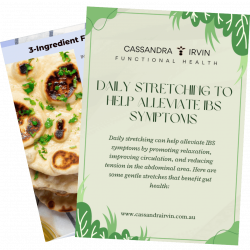When we think about health, we often focus on the obvious—exercise, eating well, getting enough sleep. But there’s a hidden world inside us that’s just as crucial to our well-being: our gut bacteria. These tiny organisms play a massive role in our overall health, and looking after them is key to ensuring they look after us in return.
Why Gut Bacteria Matter
Your gut is home to trillions of bacteria, collectively known as the gut microbiome. These little helpers are involved in everything from digesting food and absorbing nutrients to regulating your immune system and even influencing your mood. A healthy, balanced gut microbiome is essential for good digestion, strong immunity, and mental well-being. But when this delicate balance is disrupted, it can lead to a host of issues, including bloating, IBS, and even mood swings.
How to Support Your Gut Bacteria
1. Eat a Diverse Diet: Your gut bacteria thrive on variety. Incorporating a wide range of fruits, vegetables, whole grains, and fermented foods like yoghurt and sauerkraut into your diet helps nourish different types of bacteria. The more diverse your diet, the more diverse your gut microbiome, which is a sign of good gut health.
2. Limit Processed Foods: Highly processed foods, especially those high in sugar and unhealthy fats, can negatively impact your gut bacteria. These foods can promote the growth of harmful bacteria while starving the beneficial ones. Try to minimise processed foods and opt for whole, unprocessed options instead.
3. Stay Hydrated: Drinking plenty of water helps keep your digestive system running smoothly and supports a healthy gut lining. Proper hydration also aids in the absorption of nutrients that your gut bacteria need to thrive.
4. Manage Stress: Chronic stress can disrupt your gut bacteria, leading to an imbalance that affects your digestion and overall health. Practices like meditation, deep breathing, and regular exercise can help keep stress in check and support a healthy gut.
5. Consider Probiotics: Probiotics are supplements that contain live beneficial bacteria. While not everyone needs them, they can be helpful in restoring balance to your gut microbiome, especially after a course of antibiotics or during times of digestive distress. Always choose high-quality probiotics and consult with a healthcare professional to find the right option for you.
The Gut-Body Connection
The phrase “you are what you eat” takes on new meaning when you consider the impact of your gut bacteria on your health. A well-nourished gut microbiome can help you feel energised, balanced, and more resilient to illness. On the flip side, neglecting your gut health can lead to a variety of issues that ripple throughout your body.
By taking steps to care for your gut bacteria, you’re investing in your overall health. So, as you plan your meals, manage your stress, and make lifestyle choices, remember to think about those tiny helpers in your gut. Look after them, and they’ll look after you, keeping you healthy from the inside out.
In Summary
Gut health isn’t just about avoiding digestive discomfort—it’s about supporting the whole ecosystem inside you. By eating a diverse diet, staying hydrated, managing stress, and considering probiotics, you can nurture your gut bacteria and, in turn, support your overall well-being. Your gut is more than just a digestive system; it’s a crucial part of your health that deserves attention and care.

References:
Harvard T.H. Chan School of Public Health. (n.d.). The Microbiome. Retrieved from [Harvard T.H. Chan](https://www.hsph.harvard.edu/nutritionsource/microbiome/)
Mayo Clinic. (2023). Gut Health: How to Maintain a Healthy Gut. Retrieved from [Mayo Clinic](https://www.mayoclinic.org/healthy-lifestyle/nutrition-and-healthy-eating/in-depth/gut-health/art-20483112)
Johns Hopkins Medicine. (n.d.). The Brain-Gut Connection. Retrieved from [Johns Hopkins Medicine](https://www.hopkinsmedicine.org/health/wellness-and-prevention/the-brain-gut-connection)
Cleveland Clinic. (2022). Probiotics: What is it, Benefits, Side Effects, Food & Types. Retrieved from [Cleveland Clinic](https://my.clevelandclinic.org/health/articles/14598-probiotics)
National Institute of Diabetes and Digestive and Kidney Diseases (NIDDK). (2019). Your Digestive System & How It Works. Retrieved from [NIDDK](https://www.niddk.nih.gov/health-information/digestive-diseases/digestive-system-how-it-works)

